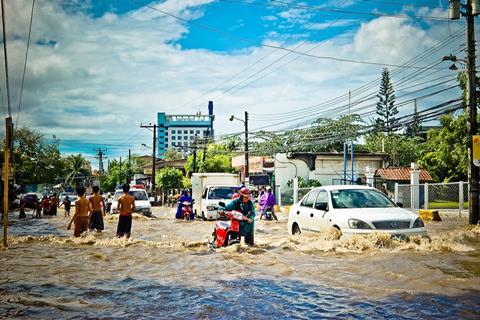Diarrhoea is globally the second largest cause of death for children under 5. Contributing to more than 500,000 deaths, only pneumonia kills more children each year. Climate change, driving increased flooding and droughts, threatens the fragile progress made in reducing the burden of diarrheal disease over the past decades.

Together with the Amsterdam Institute of Global Health and Development, Amsterdam UMC is set to lead a global consortium in the hunt for improved interventions.
“We see that the impact of climate change on diseases transmission depends on the constantly changing interaction between climate events, local vulnerabilities and exposure to disease-causing microorganisms,” says Vanessa Harris, Assistant Professor of Global Health at Amsterdam UMC. “For example, sudden heavy rain can cause sewers to overflow and contaminate water supplies or increasing temperatures can cause some pathogens to live longer outside the body,” Harris adds.
Mapping the terrain
To facilitate effective policy responses in countries that are the most vulnerable to the impacts of climate change, more knowledge is necessary. For Harris’s consortium the initial aim is to understand how climate change’s impact on water supplies and the environment will affects the spread of key pathogens and, thus, the risk of contracting diarrheal disease.
“By bridging this knowledge gap, we can map which areas are more at risk and why, allowing communities and policy makers to prepare and adapt locally,” says Harris.
“We’ll do this by bringing together a broad range of experts – from climate experts and engineers to anthropologists, health economists, and public health experts – and then using broad-scale modelling and community-based case studies to describe the consequences of climate change on diarrheal burden and identify which local interventions will be most effective into the future.”
Firsthand experience
Dr. Dzidzo Yirenya-Tawiah and Dr. Adelina Mensah, both environmental scientists at the University of Ghana, have conducted multiple community-based studies and seen the effects of climate change on health first hand.
“Many of our fishing communities are exposed to frequent flooding events from sea level rise, storm surges and erratic rainfall events, which sometimes all occur at the same time and have devastating consequences on infrastructure and water supplies. Quality of surface and groundwater is especially compromised through unknown pathways of disease transmission. With limited alternative resources, health risks are exponentially increased,” says Mensah.
Horizon Grant
Ghana is not the only country where case studies will be performed, the consortium will also carry out research in Tanzania, Romania and Italy. In all four countries, case study sites are chosen due to their susceptibility to both flooding and drought.
However, there are also individual characteristics that will provide the consortium with unique insights. For example, in Naples, proximity to farming and agriculture, coupled with an ageing urban water infrastructure provides added risks. Haydom, Tanzania is an extremely rural setting with high rates of malnutrition and poverty and increased exposure to food insecurity.
Dr. Estomih Mduma is a Public Health researcher at Haydom Lutheran Hospital and sees how diarrhoea diseases are a major cause of hospital admission, child morbidity and mortality in the hospital. The limited accessibility to water compromises the effort to reduce the burden of diarrhoea in this vulnerable population. These vulnerabilities are part of what the SPRINGS consortium plans to tackle, and thanks to a Horizon grant worth 6.5m euros, the project will draft concrete policies that are ready to be implemented.
Predicting risk
“We want to get to the stage where we can predict local and national risks and use this evidence to shape policy. This means understanding where water quality and pathogen surveillance needs to be performed to support communities and governments in prioritising their limited resources across health and environmental sectors. Ultimately, combing better mapping and more surveillance coupled with targeted interventions should reduce illnesses and deaths,” concludes Harris.
The SPRINGS consortium consists of Amsterdam UMC, AIGHD, the Norwegian Meteorological Institute, the University of Virginia, the University of Ghana, the London School of Health and Tropical Medicine, Three o’Clock, Aarhus University, the IHE Delft Institute for Water Education, The Abdus Salam International Centre for Theoretical Physics, the Vrije Universiteit Amsterdam, the University of Naples, the Haydom Lutheran Hospital, AQUATIM, the University of Bucharest and the Dutch National Institute for Public Health and the Environment (RIVM).
Topics
- Adelina Mensah
- Amsterdam Institute of Global Health and Development
- Amsterdam UMC
- Clean Water
- Climate Action
- diarrheal diseases
- Disease Treatment & Prevention
- Dzidzo Yirenya-Tawiah
- Estomih Mduma
- Haydom Lutheran Hospital
- One Health
- People News
- Public Health
- Sample preparation, filtration, detection and treatment techniques for water-borne pathogens
- springs
- UK & Rest of Europe
- Vanessa Harris







No comments yet